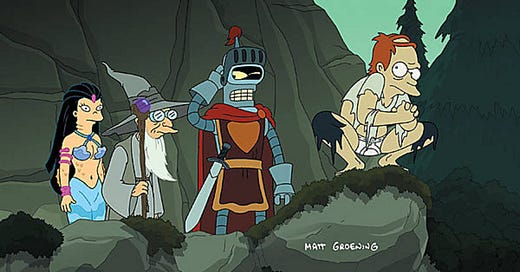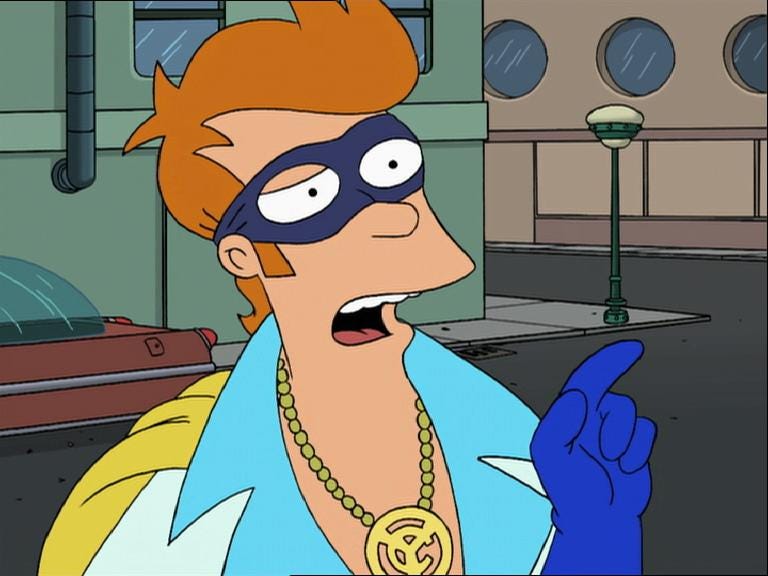When Disney Owns The National Myths
As an undergraduate, I took a class on old and middle English literature, and the professor sneakily had it double as a class on the evolution of the Arthurian story in British literature. As I drew a line from Geoffrey of Monmouth to Marie of France to Thomas Mallory, it began to seem as if the Arthurian legend was an enduring national legend, part of the collective cultural subconscious of England. The real fun in reading all its iterations was in teasing out a history-infused answer to the question, "What does it mean to lead Great Britain in this particularly dark and scary time?"
At the end of the semester, the professor threw open the floor to everyone's questions about the whole syllabus. My question: "What is the U.S. analog to the Arthurian legend? Is it Elvis? Is the Weekly World News our Morte D'Arthur? IS BATBOY OUR GALAHAD?"
I've been asking myself intermittently, "What is America's King Arthur?" ever since.
For a while, I wondered if we as a nation were actually going to be so literal-minded as to make it the Kennedys -- there is an SFF anthology called Alternate Kennedys and "Prince Pat" is George Alec Effinger's what-if about Patrick Bouvier Kennedy restoring the presidency unto the Kennedys thanks to his round table of cousins.
Then I wondered if we as a country were still too young to have our Arthurian legend yet -- after all, the stories about Arthur are about a thousand years old, iterating from tribal battle-leader to king of a fallen empire to idealist in early nation-building.
But the point to the Arthurian legend is that it is both a narrative and the reflection of a culture creating and propagating its own definition. It's like a daily affirmation, only with strange women lying in ponds distributing swords as a basis for a system of government.
And thus -- after nuking an RSS feed filled with stories about the Snyder Cut of the Justice League movie and debates about whether or not one has to watch 23 movies in the Marvel Cinematic Universe and/or read comics to enjoy WandaVision, -- it hit me: the United States of America's national mythos is being crafted and iterated in our comic book stories.
The Arthurian legend always has a dude, his wife, and a treacherous nephew, but its enduring appeal is fed by the story's variations. There are side epics about romances, quests, family succession drama, coming of age, or jockeying for power in a golden era. There is the definition and constant renegotiation of what it means to be part of this thing that's larger than yourself. And there are reboots and rewrites and retcons galore!
Sounds a whole lot like the comics industry, no?
Superman remains compelling is because he was created to represent the embodiment of the American dream -- an immigrant who improves his adopted homeland simply because he believes in the land that gave him opportunities to thrive. More recent Superman stories have examined more critically what it means to dedicate one's life to a dream that will never fully open itself to you -- a quest echoed in generations of Chinese and Japanese populations in California, for example.
A recent analysis of the American electorate called Marvel movies "community-binding myths." Not for nothing has screenwriter John Rogers identified the mindset "fandamentalism" as "fans who violently believe the only valid interpretation of any entertainment source is a dogmatic adherence to their favorite version of that source. Any change to the smallest detail is inherently unacceptable (see also 'heresy') and met with frantic scorn."
What has been interesting about the last two decades is how the Marvel entertainment juggernaut has emerged as a constant topic in cultural commentary in tandem with the increasingly fraught political debates on what it means to be American, what America really is, and what this country should be.
When the corporation owns the myth-making apparatus, what sort of community is made?
SO WHAT?
A lot of the critique around the Marvel cinematic universe swirls around its house style -- and there is a very definite formula for everything from story composition to fight choreography -- and how that affects cinema at large. Even more of the critique around the Marvel cinematic universe swirls around how it's changing the way films get made in Hollywood. And still more critique swirls around how Marvel is changing the way people think of movies -- less as self-contained artistic experiences and more as episodic entertainment intervals within a larger experience. (Yes, like a theme park, as Martin Scorsese has said.)
If we're forming our national narratives around these theme-park stories, let's see more critiques about the stuff that floats free of the format and the business model.
Yes, the Captain America: The Winter Soldier is about expanding the character roster and cinematic universe; it's also a meditation on the persistence of subversive, anti-democratic social movements that nest like parasites within insufficiently vigilant host organizations.
Yes, Thor: Ragnarok is a movie about two dudes on a space road trip; it's also an argument for a definition of statehood that doesn't rely on imperialism but shared social investment ("Asgard is not a place. It's a people").
Yes, the two-parters Avengers saga, Infinity War and Endgame is about doing a victory lap after successfully teeing up two dozen prequels, but the entire premise -- an outsider with superior firepower and literally no respect for any pre-existing civilization decides to rearrange the world to suit himself; everyone else understandably objects -- could also serve as an easy entry point to a discussion about colonization and its effects on the colonized.
And on it goes. Every movie is a genre riff done within the constraints of the house formula -- and every movie can be used as a social parable.
WHO CARES?
Culture warriors.
Pop culture is a reflection of America's shared social subconscious -- it's the base of common reference for discussions, a handy starting point for talking about more abstract ideas. This is why people get worked up over filter bubbles: Because they make it easy for people to opt out of a shared reality.
This is also why people get worked up over what gets depicted and normalized in our pop culture; if the pop culture is the bedrock of a shared understanding, what's in that foundational layer matters.
Look at the first TV show Marvel and Disney chose to roll out, WandaVision -- it was all about the trauma one immigrant experienced from childhood on, how that trauma radiated out into her community, and how government agencies chose to respond to that trauma with the same failed approaches that created it in the first place.
The second show, The Falcon and the Winter Soldier, is shaping up with an ongoing narrative around humanitarian crises among displaced populations. One cannot help but be reminded of climate-change refugees whose former homelands are literally uninhabitable.
Yes, both shows are accessorized with the same "carceral capitalist propaganda" and big weapons that make the MCU so appealing to people who like shiny toys and displays of brute strength. One watches the shots of people in tactical gear moving across cavernous hangars and is reminded of how semiotically powerful that imagery is:
“It’s an obsession with the idea not just of the right stuff, but of the special stuff. Equipment fetishism. The costume and semiotics of achingly elite police and military units. Intense desire to possess same, of course, and in turn to be associated with that world. With its competence, its cocksure exclusivity.”
-- William Gibson, Zero History
Yet the aspirational aesthetic framing in the TV shows only amplifies stories that seem to contradict the very desirability of membership in an elite, socially separate military unit. So far, Marvel has chosen to show the ineptitude and moral vacuity of "cocksure exclusivity" in the face of global problems.
From 2016 on, Disney-owned Marvel has been rolling out stories about the damages of colonialism, the benefits of global support and accountability, the consequences of unchecked power, and the importance of consent. These are the ideas that are becoming incorporated into our community-binding myths. The question is whether, when and how reality catches up to the androids, aliens and wizards in our stories.
REMINDER
There’s a reader survey to take — please roll on over and tick the boxes if you haven’t done so yet. If you have, thank you for your time!





